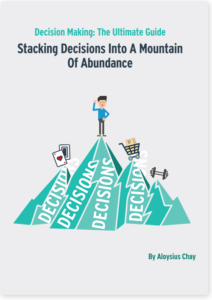25 Apr Beware when listening to financial advice.
We’ve seen it time and again whereby someone refuses to do their own due diligence and get sorely disappointed when they see their assets dropping in value. Due diligence does not ensure that you do a good investment, but it gives you a peace of mind. That is extremely important because investing is a very emotional act and understanding whatever you are buying allows you to sit through the short term swings based on your own intuition rather that someone else’s advice.
Warren buffet gave a great example whereby if you were given an opportunity to buy into a solid business just down the street. You would not ‘sell the shares’ just because the news says this or that. If the business did not change it’s fundamentals, we will continue to see it grow through the years. ( Also the fact that we will not be able to sell because its not listed on the stock exchange )
However, if one were to want to invest just based of someone else’s advice, here’s a small list of common mistakes that I’ve observed people eager to get into investing make.
1 – ‘ John has been right on his investments most of the time. I am looking to invest so I shall replicate his portfolio and distribution immediately ‘
Fallacy – Lack of consideration for John’s entry prices. John’s holdings might have ballooned over time and may not have as much upside as before.
2 – ‘ John told me he is selling X asset today. I shall do it too! ‘
Fallacy – John might have had huge gains from asset X and needed to re-balance his portfolio by selling. A better question for John would be whether he is long ( betting that it will go up ) or short ( betting that it will go down )
3 – ‘ John is long on asset X. ‘
Fallacy – Lack of consideration for investment timeframe. John could be long on asset X for the next 3 months while waiting for an event that could move the prices. But John may not fundamentally believe in the asset as a long term investment of over 5 years for example. This is tricky because there is a problem of not following up when John changes his investment thesis and decide to sell.
4 – ‘ John is long on asset X and believes that it will be a good long term hold’
Fallacy – Lack of consideration for personal circumstances. John may be on a completely different life trajectory and is able to take more or less risk than you. A good starting point to think about is
1) Are you at the ideal level of savings or cashflow to prevent forced liquidation of your assets ( You can find on the net they advise 6 months of emergency savings but it is really up to each individual )
2) What risk tolerance do you have as a person – I find that no matter what quiz or evaluation method one have done, the best way to find out is still through experience and self awareness.
On awareness through self inquiry ( 26 Apr 2021 )
I believe most of the portfolio allocation and distribution should be done proactively through self inquiry. That means to ask yourself questions like how much emergency savings do you need based on your situation and so on. And do it before any price action. The earlier and deeper the self inquiry is done, the better it is.
If you find yourself wanting to reallocate assets when an asset price changed but nothing fundamentally changed – it could be a reactive move which may be caused by FOMO or fear of loss, instead of rational thinking. But remember, this happens to even the best of us. The learning journey begins when we question our every move to see if it’s as sound as we think it is.
I will continue to update this as if I get any new ideas but in the meantime , huat ah!
This is not financial advice.




Sorry, the comment form is closed at this time.